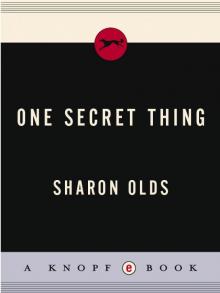Read One Secret Thing Storyline:
Sharon Olds completes her cycle of family poems in a book at once intense and harmonic, playful with language, and rich with a new self-awareness and sense of irony.The opening poem, with its sequence of fearsome images of war, serves as a prelude to poems of home in which humor, anger, and compassion sing together with lyric energy—sometimes comic, sometimes filled with a kind of unblinking forgiveness. These songs of joy and danger—public and private—illuminate one another. As the book unfolds, the portrait of the mother goes through a moving revisioning, leading us to a final series of elegies of hard-won mourning. One Secret Thing is charged throughout with Sharon Olds’s characteristic passion, imagination, and poetic power.The doctor on the phone was young, maybe on hisfirst rotation in the emergency room.On the ancient boarding-school radio,in the attic hall, the announcer had given myboyfriend’s name as one of twobrought to the hospital after the sunriseservice, the egg-hunt, the crash—one of themcritical, one of them dead. I was looking at thestairwell banisters, at their lathing,the necks and knobs like joints and bones,the varnish here thicker here thinner—I had saidWhich one of them died, and now the world wasan ant’s world: the huge crumb of eachsecond thrown, somehow, up ontomy back, and the young, tired voicesaid my fresh love’s name.from “Easter 1960”From the Trade Paperback edition.From Publishers WeeklyThe ninth outing from Olds (Blood, Tin, Straw) should again please the many admirers of her raw, vivid and often explicit poems, but might surprise few of them—until the end. As in all her books, Olds works in a demotic free verse, driven by rough enjambments and shocking comparisons: she devotes much of her energy (three of five sections here) to sex, remembered pain and parenthood—the dramatic, abusive household in which she grew up and her tender relationship with her own daughter. Olds depicts the traumas of her first decades with undeniable, if occasionally cartoonish, force: When I think of people who kill and eat people,/ I think of how lonely my mother was. Olds can also offer high-volume poetry of public protest, as in the set of sonnet-sized poems against war with which the book begins. What seems new here are Olds's reactions to her mother's last years, and to her mother's death. On an antidepressant, briefly adorable, and then in failing health, my mother sounds like me,/ the way I sound to myself—one/ who doesn't know, who fails and hopes. Both the failures and the hopes find here a voice that takes them seriously. (Sept.) Copyright © Reed Business Information, a division of Reed Elsevier Inc. All rights reserved. From BooklistStarred Review An audacious virtuoso, Olds shares perceptions so archaic they predate consciousness and tells of dark deeds worthy of Greek myths transpiring in an otherwise ordinary middle-class, mid-twentieth-century American household. What makes her work so potent is her countering of the shock and shiver of her baroquely bloody revelations with poetic structures so refined and sturdy, they have something of the Shaker about them, minus, of course, the celibacy. Olds is a moralist, and she does believe in confession, in expiation, as long as it is contained in clean-lined, well-keeled vessels. In another breathtaking collection, Olds begins with “War,” a portrait gallery of the displaced, the maimed, and the cruel, iconic poems as haunting as paintings by Goya. She then extends her long series on family trauma, writing with chilling restraint of moments of malevolent selfishness, brutality, and weirdness. But Olds also writes with tremendous assertion about a tormented girl’s revenge as she comes into womanhood, and here Olds sees her fierce mother gentled by age and illness, their terrible adversity canceled as death nears. This is a pivotal collection, and Olds signals a sea change in moments of gleeful self-mockery and resounding catharsis. --Donna SeamanPages of One Secret Thing :
